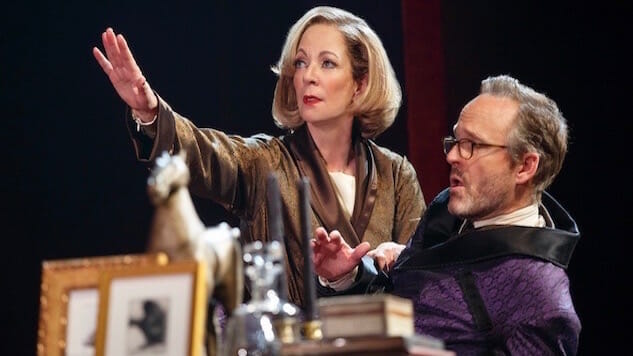
She is well-intentioned and can be warm one-on-one but has lived in a bubble for so long she projects as smug and phony; every word he says is a lie yet he thrums with an intensity that has his audience leaning in, desperate to believe him.
John Guare’s Six Degrees of Separation (in revival at the Ethel Barrymore Theatre) debuted in 1990 when Hillary Clinton was a governor’s wife and Donald Trump was a sleazy, egomaniacal real estate millionaire yet the play still resonates powerfully today. And not just in the echoes of the presidential campaign in the characters of Ouisa, the wealthy and insular Upper East Sider, and Paul, the street hustler she takes in after being taken in by his con.
Unfortunately, Trip Cullman’s dubious direction steers swaths of the play—especially in the middle (already the weakest section)—well off the mark. He creates a loud, hysterical environment that may have been intended to play as farce to show how artificial the world of the elite is but instead frequently flops, creating a distance between the play and the audience.
The play opens with the wealthy Ouisa (Allison Janney) and her husband Flan (John Benjamin Hickey) talking directly to the audience, contradicting each other, nudging us toward the perception of reality they want us to see. They are hosting an old friend, Geoffrey (Michael Siberry), who lives in South Africa (this is back in the apartheid era) and is even wealthier than they are; they’re trying to seduce him into investing in a private art deal Flan badly needs to pull off. Suddenly, an interruption: the doorman brings in a young black man, who is bleeding, saying he needs their help and is a Harvard classmate of Ouisa’s and Flan’s children.
Paul (Corey Hawkins) has been mugged—his money and his thesis was stolen—and his father won’t be in town until morning. He soon lets slip that his father is none other than groundbreaking actor Sidney Poitier. Eager to burnish their tolerant, even liberal bona fides, the couple allows Paul to stay, to make them dinner (and clean up after) and to regale them with tales of daddy, who is directing a film of Cats, which is the butt of countless jokes (the first few are very funny, the rest merely tiresome). In exchange, Paul allows them to feel good about themselves. The fact that his charm and passionate storytelling helps Flan seal his business deal and his promise for them of parts as extras in Cats only made the evening that much glorious.
Except it was all a fake, as the couple eventually learns, beginning with the shocking discovery the next morning of Paul having sex with a strange young man in their daughter’s bedroom. The audience knows Paul is a con man, of course, since it’s the essential plot point of a now-famous play and movie, yet Guare’s writing here is so sly and funny and Hawkins’ vibrant and alluring performance is so winning it allows you to see how Ouisa and Flan—or anyone eager to don blinders to keep out things they don’t want to think about—would buy his every word.
Paul’s crowning moment that first night is an explanation of his thesis, a long monologue about the phonies in Catcher in the Rye: he references Chekhov and Beckett, he bemoans the modern paralysis of our imagination (written decades before we started spending our waking hours staring at “social media” apps on our phones), and challenges us to face our true selves. It’s all a lie—he later confesses to having cribbed it from a speech someone else gave—but it feels like the play’s most searing and honest moment.
The problem is that it feels that way only in part because of how good it is; after Paul flees the apartment the next morning, the play loses some focus over the next half-hour while the secondary performers bring to life Cullman’s worst instincts. The usually reliable Michael Countryman along with Lisa Emery, plays another couple conned by Paul but Countryman plays it too broadly. However, he’s a model of subtlety compared to the children of both couples and a doctor who is also lured in by Paul’s talk. All these parts, as well as the innocents from Utah who truly pay the price for Paul’s selfish behavior, are thinly written at best but Cullman’s decision to have the parents and college-age children play everything at maximum volume from the first moment leaves no room for, well, drama. If it’s meant to satirize these types it doesn’t work—it’s not funny enough so it becomes boring instead.
Fortunately, Janney, who starts out too arch and theatrical, ultimately grounds her performance and gives Ouisa enough sincerity to lend the play’s climactic scenes between her and Paul and between her and her husband the power that Paul’s earliest scenes provided. (Hickey as Flan is adequate, it’s hard to determine whether the character is truly a lightweight or if a stronger performance could have lent Flan more heft.)
The play’s title, the idea that everyone is linked to everyone else, quickly entered the popular lexicon (with a little inadvertent help from Kevin Bacon) but the notion is shattered at the end both by Paul’s isolation and by the realization that neither he nor anyone else involved really was connected to their own selves, much less to anyone else. In an era where soaring inequality really have let the rich become different from you and me and where technology serves to separate as much as to connect, Guare’s play still speaks the truth.
Starring: Allison Janney, John Benjamin Hickey, Michael Siberry and Corey Hawkins
Written by: John Guare
Directed by: Trip Cullman
Through: July 16 at the Barrymore Theatre